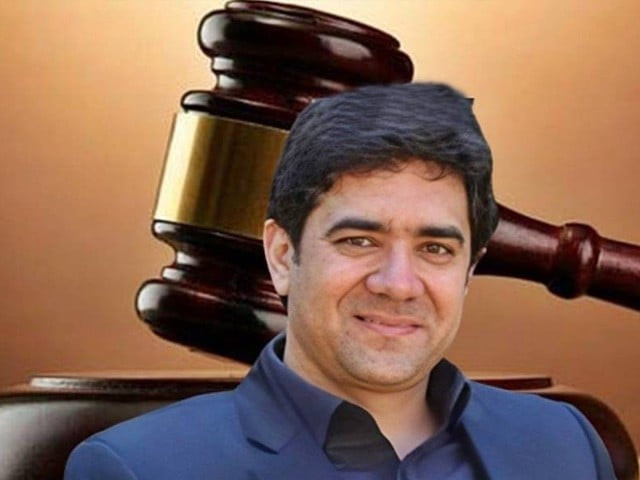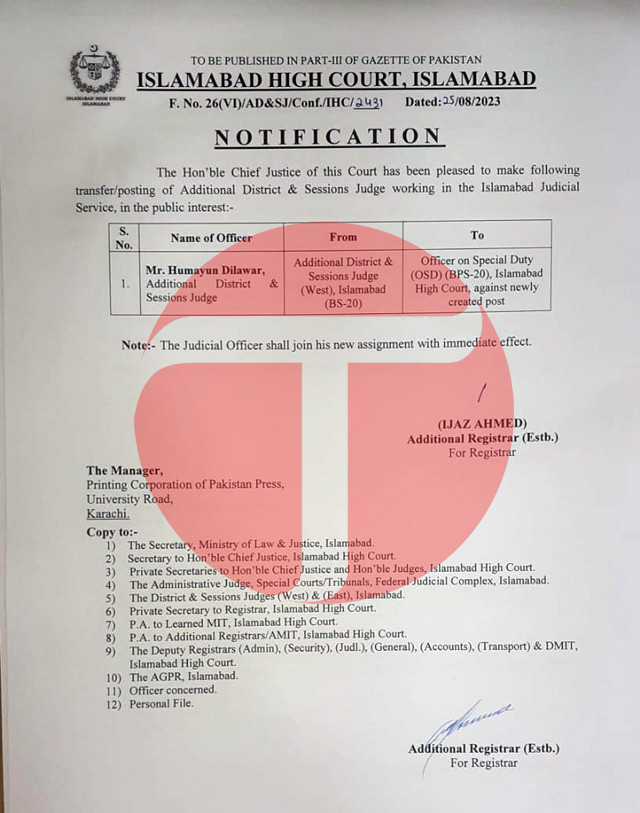Judge who convicted Imran made OSD in IHC
Notification says ADSJ transferred in public interest with immediate effect

Judge Humayun Dilawar, who sentenced former prime minister Imran Khan in the Toshakhana criminal proceedings case earlier this month, was transferred from the post of additional district and sessions judge (ADSJ) on Friday.
According to a notification issued by the Islamabad High Court (IHC), Judge Dilawar – a Grade 20 officer, serving as the ADSJ (West), Islamabad – was made an officer on special duty (OSD), on the instruction of Chief Justice Aamer Farooq.
The judicial officer was made OSD on a on a newly created post in the IHC, the notification said. It added that the IHC chief justice had transferred the judge to the new post in public interest.
“The Hon'ble Chief Justice of this Court [IHC] has been pleased to make following transfer/posting of Additional District & Sessions Judge … in the public interest,” the notification said, mentioning the name of Judge Humayun Dilawar below.

“The Judicial Officer shall join his new assignment with immediate effect,” the notification added.
Judge Dilawar, who recently attended a judicial conference at a university in Britain, had been directed to report to the IHC.
On Aug 5, Judge Dilawar had sentenced Pakistan Tehreek-e-Insaf (PTI) Chairman Imran Khan to three years in jail and a fine of Rs100,000 in the Toshakhana criminal case filed by the Election Commission of Pakistan (ECP).
Judge Dilawar was removed from his position following a letter he sent to the Islamabad High Court (IHC) on Aug 17, expressing concerns about his safety. The move came after Judge Dilawar faced criticism and harassment from the PTI supporters subsequent to delivering the verdict in the Toshakhana case. This backlash extended even during his stay in the UK, where the PTI activists protested against him.
According to sources, upon returning to Pakistan from Britain on Aug 16, Judge Dilawar promptly wrote to the IHC registrar the next day. In the letter, he detailed his apprehensions regarding personal security. He cited a social media campaign that emerged both during and after the trial, which resulted in substantial threats originating from various individuals worldwide.
Also read: Judge who convicted Imran faces harassment by PTI supporters in UK
Judge Dilawar highlighted that the threats extended to his family in his hometown and disrupted his children's schooling due to security concerns. He also mentioned that while attending a training session at the University of Hull during a visit to the UK, he and his fellow judicial officers faced unsettling incidents.
In light of these circumstances, Judge Dilawar requested a transfer to an alternate posting, ideally within special courts located at the Judicial Complex G-11 or the Islamabad High Court.
Appeal against judgment
After the PTI challenged the Toshakhana case decision in both the IHC and the Supreme Court, the latter expressed concerns regarding the trial's fairness.
Chief Justice Umar Ata Bandial, heading an SC bench, noted potential flaws in Judge Dilawar’s handling of the trial. However, the apex court decided to await the IHC's verdict on the appeal before making its own ruling.
During a subsequent hearing in the IHC on Friday, Imran’s appeal against the trial court's decision and his plea for suspension of sentence was heard. The court made it clear that the IHC would not replicate the trial court's approach in the Toshakhana case.
Imran’s legal team, including Latif Khosa, Babar Awan, Barrister Gohar Ali Khan, Salman Akram Raja and Shoaib Shaheen, appeared before the court.
Notably, ECP lawyer Amjad Parvez was absent due to health issues.
Imran’s sisters, Aleema Khan and Uzma Khan, were also present in the courtroom and had discussed legal aspects with his lawyers before the hearing.
Due to the ECP lawyer's unavailability, the hearing was adjourned until Monday. During the next hearing, the bench sought arguments from the ECP lawyer regarding the plea for suspension of sentence. The ECP lawyer's assistant explained his absence, citing dehydration and poor health.
However, PTI lawyer Khosa protested against the ECP lawyer's absence, mentioning his own attendance despite being unwell the previous day.
Khosa suggested that Parvez's aide, also a senior lawyer, should argue in his place. He underscored the significance of the case, given Imran’s 20-day detention while awaiting the IHC order. The CJ clarified that the court had convened on Friday specifically for this case.
Khosa then expressed his intention to appear on Monday if the sentence suspension hearing was adjourned without a decision. He left the rostrum and exited the courtroom, prompting pro-PTI lawyers to raise slogans.
The hearing concluded with an adjournment until Monday, with directions for the ECP lawyer to present arguments.
The bench also issued a written order, specifying that if the ECP lawyer remained unwell by Monday, alternate arrangements should be made.
(WITH INPUT FROM NEWS DESK)



















COMMENTS
Comments are moderated and generally will be posted if they are on-topic and not abusive.
For more information, please see our Comments FAQ